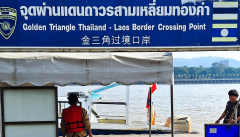Bokeo province, Laos – Khobby was living in Dubai last year when he received an intriguing message about a well-paying job working online in a far-flung corner of Southeast Asia.
The salary was good, he was told. He would be working on computers in an office.
The company would even foot the bill for his relocation to join the firm in Laos – a country of 7.6 million people nestled between China, Thailand, Cambodia, Vietnam and Myanmar.
With the company paying for his flights, Khobby decided to take the plunge.
But his landing in Laos was anything but smooth.
Khobby discovered that the promised dream job was rapidly becoming a nightmare when his Ghanaian passport was taken on arrival by his new employers.
With his passport confiscated and threats of physical harm ever present, he endured months working inside a compound which he could not leave.
The 21-year-old had become the latest victim of booming online cyber-scam operations in Southeast Asia – an industry that is believed to have enslaved tens of thousands of workers lured with the promise of decently paid jobs in online sales and the information technology industry.
“When I got there, I saw a lot of Africans in the office, with a lot of phones,” Khobby told Al Jazeera, recounting his arrival in Laos.
“Each person had 10 phones, 15 phones. That was when I realised this was a scamming job,” he said.
The operation Khobby found himself working for was in a remote area in northwest Laos, where a casino city has been carved out of a patch of jungle in the infamous “Golden Triangle” region – the lawless border zone between Myanmar, Laos and Thailand that has long been a centre for global drug production and trafficking.
He said he was forced to work long days and sleep in a dormitory with five other African workers at night during the months he spent at the scam centre in the Golden Triangle Special Economic Zone.
Khobby recounted the original message he received from an acquaintance encouraging him to take the job in Laos.
“My company is hiring new staff”, he said, adding that he was told the salary was $1,200 per month.
“He told me it was data entry.”

Casino city
The Golden Triangle Special Economic Zone (GTSEZ) where Khobby was lured to for work operates as an autonomous territory within Laos.
Leased from Laotian authorities by Chinese national Zhao Wei, whom the US government has designated the leader of a transnational criminal organisation, life in the GTSEZ is monitored by a myriad of security cameras and protected by its own private security force.
Clocks are set to Beijing time. Signage is predominantly in Chinese, and China’s yuan is the dominant and preferred currency.
Central to the GTSEZ city-state is Zhao Wei’s Kings Romans casino, which the United States Treasury also described as a hub for criminal activity such as money laundering, narcotics and wildlife trafficking.
During a recent visit to the zone by Al Jazeera, Rolls Royce limousines ferried gamblers to some of the city’s casinos while workers toiled on the construction of an elaborate and expansive Venice-style waterway just a stone’s throw from the Mekong river.

While luxury construction projects – including the recently completed Bokeo International Airport – speak to the vast amounts of money flowing through this mini casino city, it is inside the grey, nondescript tower blocks dotted around the economic zone where the lucrative online scam trade occurs.
Within these tower blocks, thousands of trafficked workers from all over the world – just like Khobby – are reported to spend up to 17 hours a day working online to dupe unsuspecting “clients” into parting with their money.
The online swindles are as varied as investing money in fake business portfolios to paying false tax bills that appear very real and from trading phoney cryptocurrency to being caught in online romance traps.
Anti-trafficking experts say most of the workers are deceived into leaving their home countries – such are nearby China, Thailand and Indonesia or as far away as Nigeria, Ghana, Uganda and Ethiopia – with the promise of decent salaries.

Online ‘butchering’
Khobby told how his “data entry” job was, in fact, a scam known in the cybercrime underworld as “pig butchering”.
This is where victims are identified, cold-called or messaged directly by phone in a bid to establish a relationship. Trust is built up over time to the point where an initial investment is made by the intended victim. This can be, at first, a small amount of the victim’s money or emotions in the case of fake online relationships.
There are small rewards on the investments, Khobby explained, telling how those in the industry refer to their victims as pigs who are being “fattened” by trust built up with the scammers.
That fattening continues until a substantial monetary investment is made in whatever scam the victim has become part of. Then they are swiftly “butchered”, which is when the scammers get away with the ill-gotten gains taken from their victims.
Once the butchering is done, all communications are cut with the victims and the scammers disappear without leaving a digital trace.

According to experts, cyber-scamming inside the GTSEZ boomed during the 2019 and 2020 COVID lockdowns when restrictions on travel meant international visitors could not access the Kings Romans casino.
In the years since, the cyber-scam industry has burgeoned, physically transcended borders to become one of the dominant profit-making illicit activities in the region, not only in the GTSEZ in Laos but also in neighbouring Cambodia and in conflict-ridden Myanmar.
Though not as elaborate as the GTSEZ, purpose-built cyber-scam “compounds” have proliferated in Myanmar’s border areas with Thailand.
The Center for Strategic and International Studies estimates that cyber-scamming in Southeast Asia generates tens of billions annually, while the United States Institute of Peace equates the threat to that of the destructive fentanyl trade.
“Cyber-scam operations have significantly benefitted from developments in the fintech industry, including cryptocurrencies, with apps being directly developed for use at [cyber-scam] compounds to launder money,” said Kristina Amerhauser, of the Global Initiative against Transnational Organized Crime.
“Victims and perpetrators are spread across different countries, money is laundered offshore, operations are global,” Amerhauser told Al Jazeera, explaining that the sophisticated technology used in cyber-scamming, along with its international reach, has made it extremely difficult to combat.

Complicit victims?
About 260 trafficked scam-centre workers were recently rescued in a cross-border operation between Thailand and Myanmar. Yet, even in rare instances such as this when trafficked workers are freed, they still face complications due to their visa status and their own potential complicity in criminal activity.
Khobby – who is now back in Dubai – told Al Jazeera that while he was coerced into working in the GTSEZ, he did actually receive the promised $1,200 monthly salary, and he had even signed a six-month “contract” with the Chinese bos





